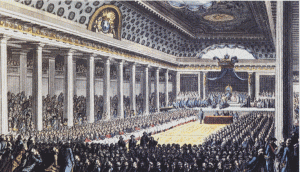Background to the French Revolution
France was ruled by a traditional European feudal system where people were divided into classes according to their birth. At the top was the King who was an absolute monarch. This meant that he had complete control over the country and did not have to consult with a parliament and could pass any law he wanted. He even had the power to have people arrested (lettre de Cachet) without trial or even killed. The King ruled over a system called the Ancien Régime.
________________________________________________________________________________________________________________
Background to the Revolution (2)
[youtube]http://www.youtube.com/watch?v=8VCfK1OLwM0&feature=related[/youtube]
This was made up of:
The First Estate: This was the Clergy of the Catholic Church. They were very powerful and controlled a lot of land, wealth and power.
The Second Estate: This was the nobles (counts, dukes, barons etc.). They were very wealthy and held many positions in the French government.
The Third Estate: This was the people who were not born into privilege. The vast majority of people in France were in this category. Some were educated professionals (doctors, lawyers etc.) and successful business people called the bourgeoisie while most were poor and uneducated labourers. They had very little influence or power.
One big issue was that virtually all the tax was paid by the Third Estate – the ones who could afford it the least. This meant that the third estate continued to struggle while the First and Second Estates remained in their privileged positions.
There were many taxes for the Third Estate to pay including:
Taille: Land tax paid to the state.
Tithe: Tax paid to the church.
Gabelle: A salt tax paid to the state.
Background to the Revolution (3)
[youtube]http://www.youtube.com/watch?v=psRZ6B9jj6k&NR=1[/youtube]
Causes of the Revolution
- The Royal family of Louis XVI and his wife Marie Antoinette lived a lavish lifestyle – living in a massive palace in Versailles with hundreds of servants; and spending their days hunting, gambling and feasting. This caused huge bitterness as the poor people of France struggled to make enough to eat. The people particularly despised Marie Antoinette for her heavy spending on clothes and jewelery. It didn’t help that she was the sister of the king of Austria – a country that was considered an enemy of France.
- This anger grew after two years of bad harvest between 1787 and 1789. The price of wheat doubled and the most important food for the poor people of France – bread – became scarcer.
- A new movement called the Enlightenment started to become very popular in France. Writers in the movement like Voltaire, Montesquieu, and Rousseau encouraged people to question the world that they lived in. This included the divine right of kings, the king himself and the Ancien Régime; and their role in an unfair and unjust society where the lives of most people was a daily struggle. Rousseau said: ‘Man is born free, yet everywhere he is in chains.’
- French soldiers returning from helping the colonists win independence in the American Revolution had been very impressed by the new country that was being born there. The ideas included in the American Bill of Rights where ‘all men are created equal’ had been heavily influenced by the ideas of the Enlightenment. The soldiers brought home from America the belief that a better society was possible.
- The downside of being involved in the American Revolution was that it cost the French so much money that it nearly bankrupted the country. The American War of Independence was only one of several wars that the French had been involved in during the previous decades and by 1789 Louis XVI was out of money.
- This led to Louis calling together the Estates General (French Parliament) so that he could raise taxes. It was the first time in over a century that it had met. The Estates General had representatives from all three estates. Louis knew however that he would have no problem getting the meeting to agree to him raising taxes on the Third Estate. This was because each estate only received one vote, regardless of how many representatives it had at the meeting. This meant that the First and Second Estate would always be able to outvote the Third Estate. The blatant unfairness of this system caused huge bitterness and eventually led them to break away to form their own meeting called the National Assembly.
_____________________________________________________________________________________________________________
History@Banagher College, Coláiste na Sionna.
The URI to TrackBack this entry is: http://teachnet.eu/tobrien/about/revolutions/the-french-revolution/background-to-french-revolution/trackback/
Leave a Comment
You must be logged in to post a comment.




